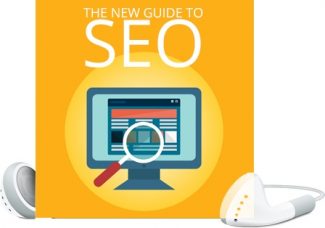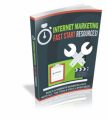 License Type: Master Resell Rights
License Type: Master Resell Rights  File Type: ZIP
File Type: ZIP
 SKU: 63600
SKU: 63600  Shipping: Online Download
Shipping: Online Download
Sample Content Preview
The Modern SEO Blueprint Report
SEO has changed a lot since the days when you could just create a bunch of low quality links to your website and expect to rank at the top of your SERPs (Search Engine Results Pages). Google is constantly getting smarter and is constantly iterating on its algorithms and if we’re going to keep bringing in traffic, then we need to know how to adapt.
In fact, continuing with outdated SEO strategies is not only unlikely to work – it can actually damage the status of your site and even result in your site being entirely de-indexed. It is entirely crucial then that you stay up-to-date with your SEO strategies then and that you stay one step ahead of Google’s algorithm updates.
This guide will show you exactly how to do that with a step-by-step guide that will provide you with a complete blueprint including everything you need to do to see massive improvements in your SEO.
Why Old SEO Methods NO Longer Work
Perhaps the best way for us to illustrate how SEO needs to be approached today, is to first examine what doesn’t work anymore and how SEO has evolved since its earlier days.
When Google was first introduced, it worked using a couple of simple processes. In order to find new content on the web, Google will use scripts known as ‘robots’ and ‘spiders’. These trawl the net by looking for links and then add the content from each site to a giant index.
When a user searches for a specific term, Google then checks the index against the search term to find the best match.
Inbound links have always been important for SEO then, as they provide Google’s spiders with a means of actually finding your site. At the same time though, Google also views inbound links as referrals or testimonies. In other words, Google assumes that your website must be good if it has lots of links pointing at it – because that means other content creators must be recommending the site to their fans.
Google can also use links as a way to deduce the topic of the website. If the links come from sites about dogs, then it is probable that your site is about dogs. And especially if the anchor text used in the link says ‘best dog website’.
The other historically important element of SEO is keywords. Keywords, or ‘key phrases’, are the terms that users search for when looking for content. This is what Google would use to try and find a ‘match’ in its index – and without keywords, it wouldn’t be able to pair the right results with the right searches.
Thus, in order to get to the top of the SERPs, all a creator once had to do was:
- Build as many links as possible
- Repeat the keywords frequently within the anchor text and within the copy of the website
But then things changed…
And changed again…
Enter Panda and Penguin
While this system worked on the whole for Google, it was only a matter of time until marketers would begin taking advantage of it. It became common-knowledge that you could game the system by creating lots of links and lots of content and this resulted in some bad practices among site owners.
Link spam became common for instance, with users posting thousands of links on sites all around the net, regardless of whether they were relevant or high quality. Meanwhile, many site owners began writing low-quality content, with keywords ‘stuffed’ into them.
Keyword stuffing essentially means repeating the same keywords over and over again, regardless of whether they fit naturally into the content. For instance, a website about buying hats might have content that reads like:
“Welcome to buyhatsonline.com where you can buy hats online! If you’re looking to buy hats online, then this is the best buy hats online website!”
As you can see, this doesn’t exactly ‘flow’ naturally.
Some site owners even began using ‘content spinners’, which would recycle old content by swapping words for synonyms. In short, a lot of dross began to rise to the top of the SERPs and Google had to respond.
It responded with two updates to the algorithm called ‘Panda’ and ‘Penguin’, released in 2011 and 2012 respectively. Panda was designed to reward high quality content by looking for in-depth articles, external links and more refined use of key phrases. Penguin meanwhile was designed to punish link spam by making the quality of the links as important as the quantity. In other words, strategies were forced to shift from posting thousands of links, to landing links on the biggest and most popular websites in their niche.
While this improved the performance of Google dramatically, it was actually a very bad time for lots of creators who had been advised to use old-fashioned SEO techniques and now were having their sites penalized or de-indexed as a result. Businesses lost thousands of daily views over night and many went on to proclaim that SEO as an industry was ‘dead’.
This has changed our approach to SEO dramatically but even that is not the end of the story. Since then, Google has been continuously iterating on its search and building upon this more solid foundation. More updates like ‘Pigeon’ helped to strengthen things like local search, while Panda and Penguin have been refined greatly.
Also interesting though are the ways that Google itself seems to be evolving and the clear path that it is on. Google is moving from being a simple search engine to become a fully-blown AI. Google no longer aims to ‘match’ keywords but rather tries to understand the actual question being asked. To that end, it has begun to use smarter methods of assessing content – such as using ‘latent semantic indexing’ and even ‘structured data’. Search has become more personal and has integrated with other tools like Google Plus to that end.
Google Home and Google Pixel perfectly demonstrate this vision that Google has for its search – allowing users to simply ask questions and being presented with an answer.
Moving forward, this is likely to increasingly become Google’s MO. And then we have other factors to consider such as real time updates to Google Penguin.
Only the creators that are smart enough to keep their SEO up-to-date and future proofed against upcoming changes will be able to survive and thrive as Google continues to evolve. And that’s what you’re going to learn right here…
- License: Master Resell Rights
- Category:Ebooks
- Tags:2020 Ebooks With Audio Master Resale Rights








